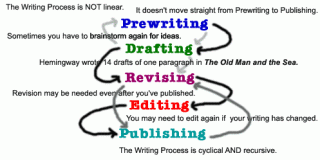Communication Arts 2

Welcome to our course, Communication Arts 2! In the past, this course in known to be as English 2 (Composition), which is a sequel to English 1 (Grammar). It was then renamed Communication Arts 2 but the focus was still anchored on composition writing. This web page will serve as as expansion of our four-walled classroom as well as extension of our limited class contact hours. We will be integrating technologies in our learning process with the hope of reinforcing and enriching your learning experience. So, jump in and enjoy learning online!
“Either write something worth reading or do something worth writing” ~ Benjamin Franklin
Edmodo Online Class
To augment our limited class contact hours, we will likewise utilize the functionalities of the website edmodo.com to the fullest. This site will host our online quizzes, online assignments, etc.
To complete your Communication Arts 2 learning experience, enroll in our edmodo.com online class platform. Here’s how:
- Use this group code to enroll: vei97t
- For students with existing Edmodo accounts, no need to create one, just use the group code to register in our class.
- For students who are new to Edmodo, follow the steps below:
- Go to www.edmodo.com
- Click the button “I’m a Student” and click “Create New Account.”
- Fill in the needed information such as: First Name, Last Name, the group code, Email address, a Username and a Password (you need to write your Username and Password in your notebook so as not to forget them), then click the button “Submit”
- You are now enrolled! You need to customize your profile by adding information about you, upload a profile image, and other details.
- Your interface is set like a social media feed where you can post status updates, message your friends and classmates including your teacher, friend/unfriend someone and follow someone or some posts.
- We will use Edmodo to host lectures, course contents, online assignments, online quizzes, online submissions, among others. Click here to view a detailed instruction on how to perform basic tasks in Edmodo.
- If you have concerns and queries, please contact me by clicking here.
- Enjoy learning online!
Course description
This is a 3-unit course in composition for college freshmen to develop their effective writing skills. Emphasis is on sentence and paragraph writing in the form of written discourse and fundamentals of research writing.
Course objective
This course aims to develop students’ skills in the analysis of the process of effective paragraph; distinguish the four forms of discourse and write compositions following the forms.
Course intended learning outcomes (CILOs)
By the end of the course, the students will be able to:
- demonstrate ability to identify and correct faulty sentences;
- apply the writing process using the forms of discourses;
- show mastery on the use of APA citation format.
Course topics
Prelim Period (Weeks 1–6)
Orientation: TIP Vision and Mission; TIP Graduate Attributes/ Institutional Intended Learning Outcomes; Program Objectives/ Program Intended Learning Outcomes; Course Objectives/ Course Intended Learning Outcomes; Course Policies. The Elements of Composition: Words: Denotation and connotation, Formal and Informal English; Sentence errors: Fragment, Comma splice, Run-on, and Faulty Parallelism; Misplaced Modifiers, Dangling modifiers. Paragraphs: Parts of paragraph, Main idea and topic sentences.
Midterm Period (Weeks 7–12)
Qualities of effective paragraph; Unity, Coherence and Transitional Markers; Paragraph writing. Outlining; Forms of Discourses: Narration, Description, Argumentation, Exposition.
Final Period (Weeks 13–18)
Fundamentals of Research Writing: Nature and Definition of Research Paper, Importance of Research, Research Process, Chapter 1: Writing the research paper, Writing using A.P.A. citation format, Definition of Terms; Chapter 2: Related Review of Related Literature and Studies. Chapter 3: Research Methodology: Research Methods, Respondents, Research Locale, Research Instrument, Data Gathering Procedure and Treatment of Data.
Course references
- Fernandez, E. et al. (2013). A Worktext in English 2: Writing in the Discipline. Quezon City: C & E Publishing.
- Serrano, J. & Ames, T. (2009). Advanced Composition. Mandaluyong City: National Book Store, Inc.
- Calderon, J. & Gonzales, E. (2012). Methods of research and thesis writing. Mandaluyong City: National Book Store.
- Tendero, E. (2011). Developing English Competency for College Students. Malabon City: Mutya Publishing House, Inc.